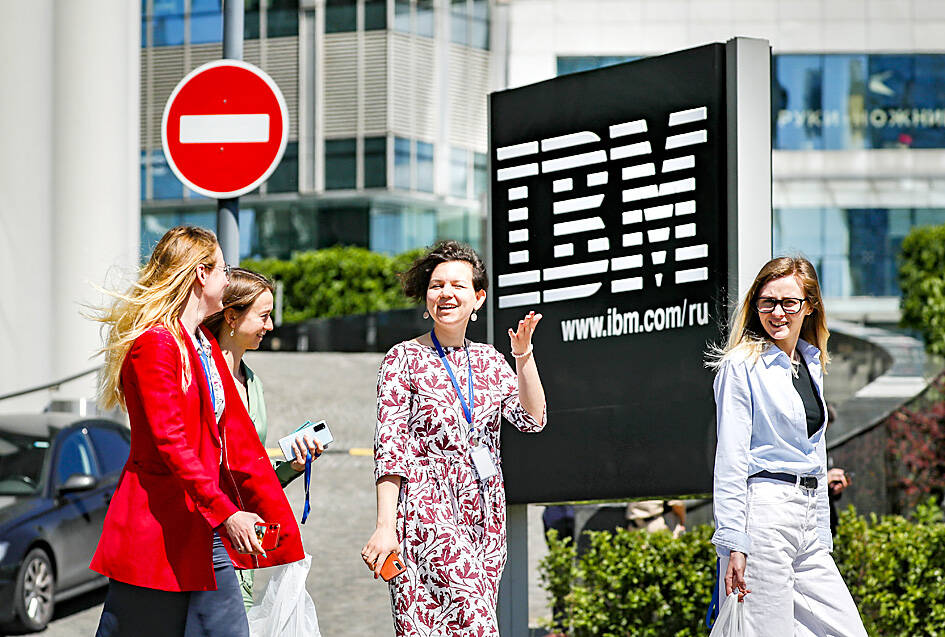International Business Machines Corp (IBM) dropped from the top spot for US patents last year, the first time in decades that the company has not claimed the most patents in a year, signaling a strategy shift at the long-time intellectual property leader.
IBM’s patent count declined 44 percent to 4,743, falling to No. 2 behind Samsung Electronics Co’s 8,513, Harrity LLP’s Patent 300 list showed.
Technologies such as semiconductors and hardware memory saw the largest drop in IBM patents, although the reduction was across all major types.

Photo: EPA-EFE
The decline reflects a strategy shift that began in 2020 to focus the patent portfolio on IBM’s core businesses and free engineers from the time-consuming patent process, IBM research head Dario Gil said in an interview.
“We decided to no longer pursue numeric patent leadership, but remain an intellectual property powerhouse and continue to have one of the strongest portfolios in the world in our priority technologies,” he said.
The Armonk, New York-based company has long prided itself on patent leadership, saying it had the highest number of filings for the past 29 years.
Intellectual property licensing and development has also been lucrative.
IBM has generated more than US$27 billion in income from patents since 1996, company filings showed.
However, that money has in the past few years slowed down as some companies have resisted licensing fees.
However, IBM is not done monetizing its intellectual property, Gil said.
“On the priority areas — hybrid cloud, AI [artificial intelligence], semiconductors, cybersecurity, quantum — we will continue to patent and defend that aggressively,” Gil added.
The shift mirrors IBM’s broader transformation away from hardware and legacy infrastructure toward cloud services and software.
Under IBM CEO Arvind Krishna, the company has made more than 25 acquisitions since April 2020, including AI software powerhouse Red Hat Inc.
IBM in November 2021 spun off a large portion of its infrastructure services business into a company called Kyndryl Holdings Inc.
The spinoff was not a reason for the patent decline last year, Gil said.
IBM has been a relative haven in the tech market meltdown, rallying 5.4 percent last year, compared with a 33 percent dip in the NASDAQ 100.
In the most recent earnings report, the company beat sales estimates and affirmed its cash flow forecast.
SAMSUNG, CHINESE FIRMS
Samsung has long been the runner-up before last year, being issued more than 8,000 new patents a year since 2017, Harrity’s list showed.
It was often awarded patents on visual display systems and voice communication.
Chinese technology firms such as TikTok parent ByteDance Ltd (字節跳動) and Internet firm Baidu Inc (百度) saw some of the steepest increases in patent issuance on the list.
For example, ByteDance has applied for a patent on a method of adding special effects to human bodies on video, commonly used in TikTok filters.
Tencent Holdings Ltd (騰訊) and Alibaba Group Holding Ltd (阿里巴巴) also saw large increases.
“Patent filings in China have been exploding for years,” Harrity analytics chief Rocky Berndsen said. “So as more of these companies do business in the US, we would expect the numbers to increase here as well.”

Intel Corp chief executive officer Lip-Bu Tan (陳立武) is expected to meet with Taiwanese suppliers next month in conjunction with the opening of the Computex Taipei trade show, supply chain sources said on Monday. The visit, the first for Tan to Taiwan since assuming his new post last month, would be aimed at enhancing Intel’s ties with suppliers in Taiwan as he attempts to help turn around the struggling US chipmaker, the sources said. Tan is to hold a banquet to celebrate Intel’s 40-year presence in Taiwan before Computex opens on May 20 and invite dozens of Taiwanese suppliers to exchange views

Application-specific integrated circuit designer Faraday Technology Corp (智原) yesterday said that although revenue this quarter would decline 30 percent from last quarter, it retained its full-year forecast of revenue growth of 100 percent. The company attributed the quarterly drop to a slowdown in customers’ production of chips using Faraday’s advanced packaging technology. The company is still confident about its revenue growth this year, given its strong “design-win” — or the projects it won to help customers design their chips, Faraday president Steve Wang (王國雍) told an online earnings conference. “The design-win this year is better than we expected. We believe we will win

Chizuko Kimura has become the first female sushi chef in the world to win a Michelin star, fulfilling a promise she made to her dying husband to continue his legacy. The 54-year-old Japanese chef regained the Michelin star her late husband, Shunei Kimura, won three years ago for their Sushi Shunei restaurant in Paris. For Shunei Kimura, the star was a dream come true. However, the joy was short-lived. He died from cancer just three months later in June 2022. He was 65. The following year, the restaurant in the heart of Montmartre lost its star rating. Chizuko Kimura insisted that the new star is still down

While China’s leaders use their economic and political might to fight US President Donald Trump’s trade war “to the end,” its army of social media soldiers are embarking on a more humorous campaign online. Trump’s tariff blitz has seen Washington and Beijing impose eye-watering duties on imports from the other, fanning a standoff between the economic superpowers that has sparked global recession fears and sent markets into a tailspin. Trump says his policy is a response to years of being “ripped off” by other countries and aims to bring manufacturing to the US, forcing companies to employ US workers. However, China’s online warriors